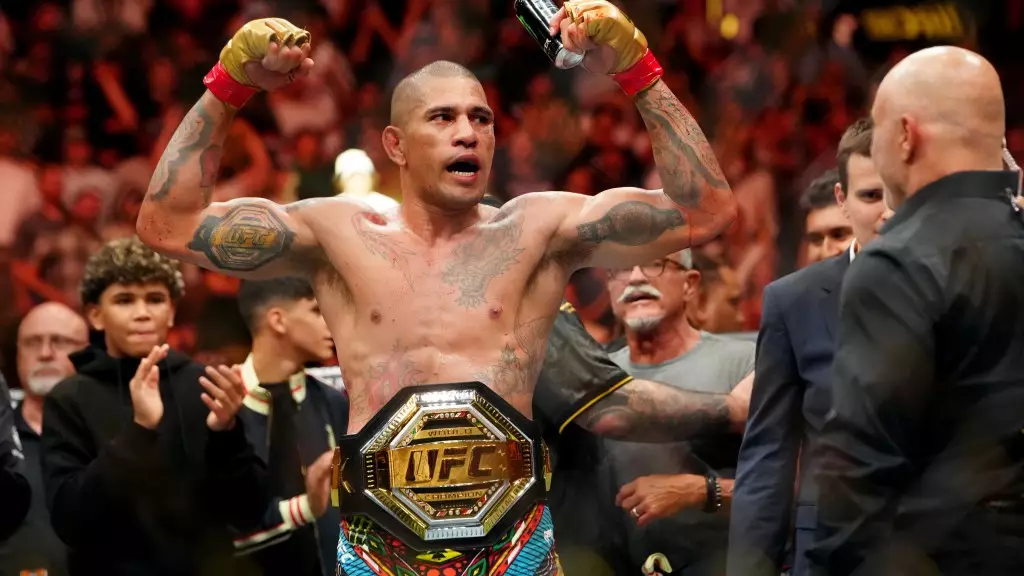In the world of mixed martial arts (MMA), consistency and frequency in competition can either bolster a fighter’s status or lead to their detriment. Alex Pereira has recently emerged as one of the sport’s most prominent figures, making waves with his engaging fighting style and a string of victories that showcase his remarkable prowess. However, the price of maintaining such an aggressive fight schedule may have begun to take its toll on the seasoned athlete. His latest bout at UFC 307 against Khalil Rountree not only highlighted his skill set but also unveiled the series of daunting challenges he faced in the lead-up to the fight.
Pereira’s journey is indicative of the duality of being a fighter; the demands to stay active while managing injuries, illnesses, and personal hurdles can create a significant mental burden. In sports, where physical health is paramount, Pereira’s determination to maintain peak performance is admirable yet also alarming. Sporting figures often grapple with the pressure to remain relevant in the spotlight, a reality that Pereira navigated with a steely resolve even as he endured numerous hardships throughout his preparation.
The lead-up to Pereira’s fight was marred with a cascade of adversities, many of which he kept under wraps until after his victory. The prevailing narrative of triumph often overshadows the relentless struggles athletes face, transforming mere mortals into heroes in the eyes of the public. Pereira’s challenges—ranging from travel disruptions due to visa issues to serious health problems—speak volumes about the immense obstacles fighters need to overcome to compete at high levels.
Pereira recounted his time spent in Brazil, grappling with not just the logistics of getting back in time, but also battling physical ailments that put his resilience to the test. With a lingering fever, throat issues, and injuries that harassed his training regime, his situation was less akin to the glamorous life fans often associate with athletes. His reflections on the difficulty of his training camp reveal the reality that, behind the victorious façade, lay numerous battles that could have derailed less determined fighters.
Moreover, Pereira acknowledged the cumulative effects of constant fighting. Competing ten times in under three years has taken its toll, and he admits that there is a limit to how much he can withstand. Recognizing the necessity of breaks within a demanding schedule reflects a level of maturity and foresight that is often ignored in the realm of professional sports.
In stark contrast to the physical battles, there’s a relentless psychological strain associated with high-level competition. Pereira’s admission of mental struggles implies a significant aspect of athletic performance that requires careful attention. Each fight is not merely a contest of physical prowess but a mental war where athletes must summon not only their skills but also their emotional fortitude. His candor regarding his mental health during this period emphasizes the importance of addressing the psychological components of training and competition, which often go unspoken in discussions centering around physical fitness.
After overcoming the daunting obstacles he faced in training, Pereira’s ultimate victory against Rountree serves as a testament to his dedication and resilience. The euphoric feeling of standing victorious in the ring is often the culmination of months, if not years, of hard work and sacrifice. However, one must ponder the balance between ambition and personal well-being. As Pereira prepares to take a much-needed respite, one can only hope that he strikes that difficult balance—a fighter’s true triumph lies not only in their victories but in their ability to preserve their health and spirit for the future.
As Alex Pereira plans for a brief hiatus after UFC 307, questions arise about the sustainability of the fighter’s lifestyle he has adopted. The continual grind of training, fighting, and recovery speaks to a larger issue within the sport: how to ensure athletes remain competitive while protecting their physical and mental wellness. As athletes like Pereira take note of the significance of rest, the future could see a shift toward more sustainable training regimens.
Ultimately, Pereira’s journey highlights an essential narrative in combat sports—the importance of both resilience and self-care. As he prepares for upcoming commitments in various locations, including Mexico and Korea, it is apparent that even champions need to step back, reassess, and recharge. For true champions like Pereira, the journey continues, driven by the dual forces of ambition and necessity as he strives for greatness while taking care of himself as both a fighter and an individual.

